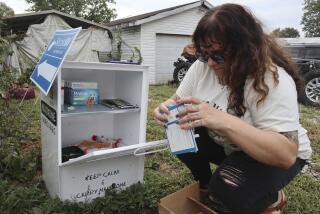A doctor’s radical treatment for pregnant addicts? Get them clean
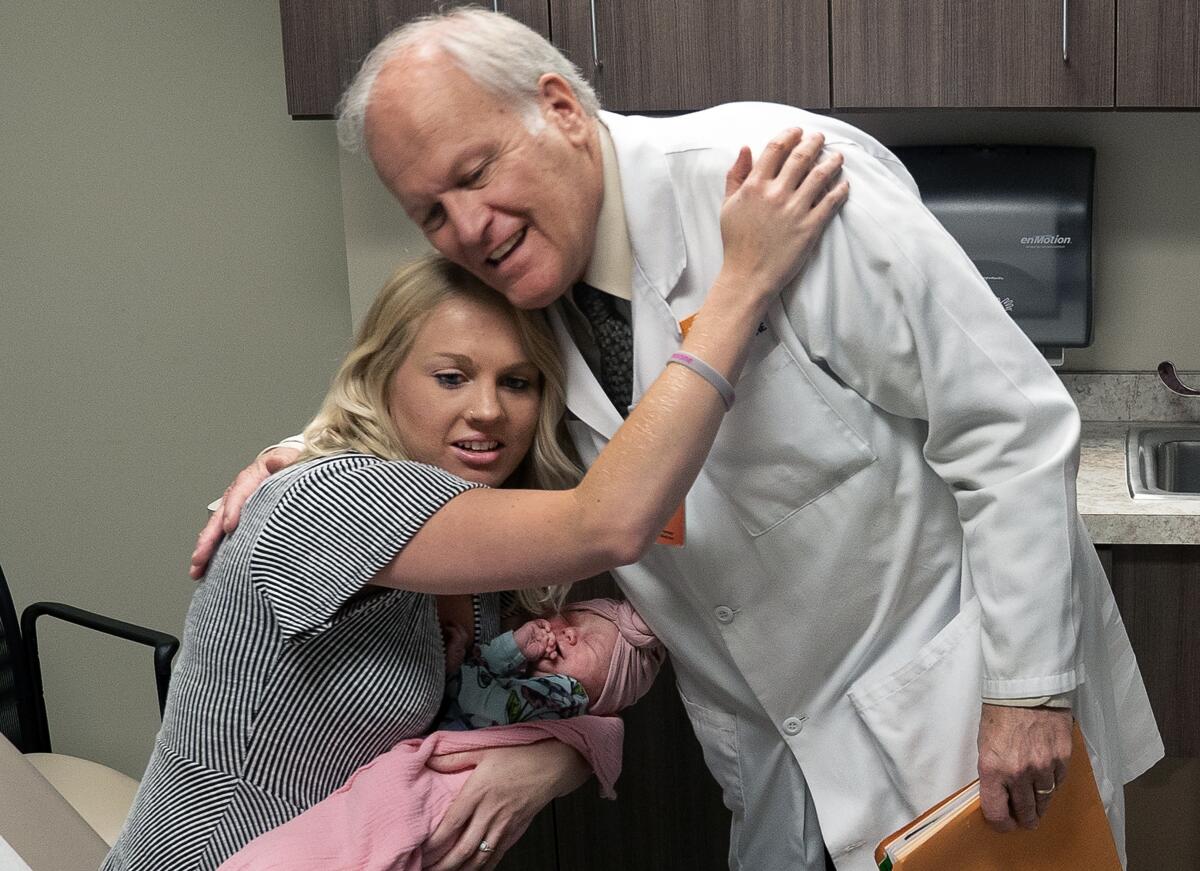
- Share via
KNOXVILLE, Tenn. — In the soft glow of the ultrasound machine in the dimly lighted exam room, Dr. Craig Towers offered his patient this assessment: “Your baby is doing great!”
But Emily Lenderman barely registered the good news. The 22-year-old was miserable. A raging staph infection had overrun the right side of her face, her skin was clammy and dark bags shadowed her eyes. Her head lolled side to side.
Towers didn’t need a drug test to confirm Lenderman, 14 weeks pregnant, was in the throes of opioid addiction, and this morning still showed the effects of having used the drug the day before. That was why Lenderman had driven 70 miles to see Towers, one of the few physicians who specializes in treating drug-addicted pregnant women.
Over the last decade, Towers has helped hundreds of patients wean off highly addictive opioids before giving birth — a surprisingly controversial approach to treating addiction. His methods have sparked backlash from the medical establishment over whether detoxing is too risky and whether pregnant patients should even be given the option of getting clean.
Looking at his watch — he had 20 other addicted patients on his schedule — Towers scooted his stool a little closer and locked his gray-green eyes on Lenderman’s. He needed her full attention.
If she chose to detox and managed to stay off drugs completely through delivery, he said, her baby would not be born with neonatal abstinence syndrome, the painful, wailing withdrawal suffered by babies of opioid users.
But there were hazards. The biggest: She could relapse.
“Then you are probably getting stuff on the street, possibly the wrong dose, and you could overdose and you can die,” he said. “If that happens, you are not here, and the baby is not here.”
The other option, Towers said, was to follow national guidelines that recommend taking opioid maintenance medications, such as buprenorphine or methadone, for the duration of her pregnancy. The danger of overdosing was lower, but the chances of her baby developing NAS were higher.
“This is your choice,” he said. “I will treat you either way. I’m not judging you. It’s your pregnancy, your life.”
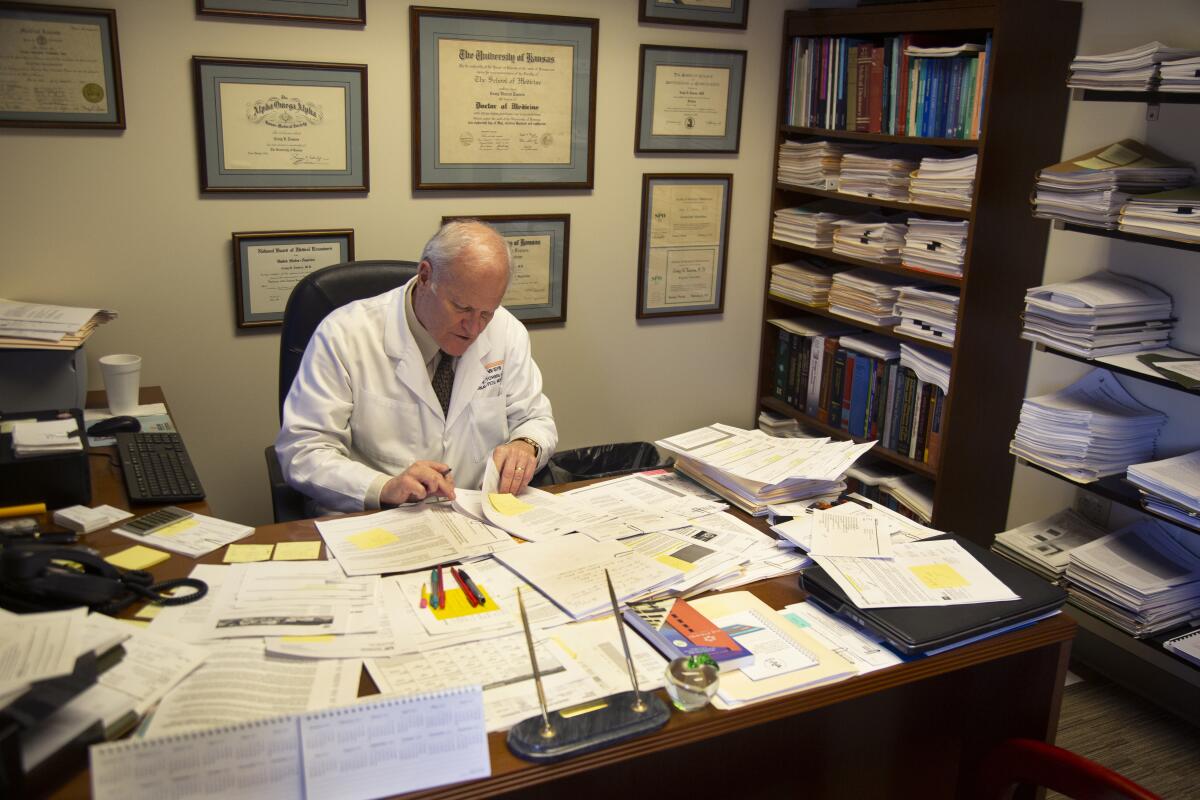
A 64-year-old who speaks in the cheerful inflection of the late actor Jimmy Stewart, Towers is an unlikely rebel, having published more than 100 papers or studies on pregnancy, disease and addiction.
He became interested in obstetrics because it required a unique mix of skills: internal medicine, surgery and research. There was also something magical about it all.
“I remember my first delivery,” he said. “It was early one morning, and I was there in the delivery room. And this head was coming out, and I thought the mother was going to split apart. And then she pushes out this thing that is alive, and I caught it. A living thing.”
Towers grew up in Downey, outside Los Angeles, and graduated in 1984 from the University of Kansas School of Medicine-Wichita. He eventually returned to Southern California and took a job as an obstetrician specializing in high-risk pregnancies.
In 2010, he moved here, joining High Risk Obstetrical Consultants, a practice affiliated with the University of Tennessee Medical Center. He focused on women struggling with diabetes, hypertension or other complications, and is most proud of helping a woman who had suffered six miscarriages give birth twice to healthy babies.
Not a year into the job, he began confronting patients addicted to opioids. They were on the leading edge of a nationwide epidemic. Today, as many as 35,000 pregnant women are abusing opioids, a drug that can lead to fatal overdoses and wreak havoc on immune systems. Nearly 20,000 babies are born in withdrawal every year. Those babies may also suffer long-term developmental and learning problems.
The American College of Obstetricians and Gynecologists had long warned that it was too dangerous to wean pregnant women off the drug. “Abrupt discontinuation of opioids in an opioid-dependent pregnant woman can result in preterm labor, fetal distress or fetal demise,” the college declared.
Instead, the college’s guidelines said doctors should prescribe opioid maintenance medications until the birth. Accordingly, Towers would reject the pleas of women who asked to detox.
“Many were upset by that answer,” he said. “It kind of depressed them.”
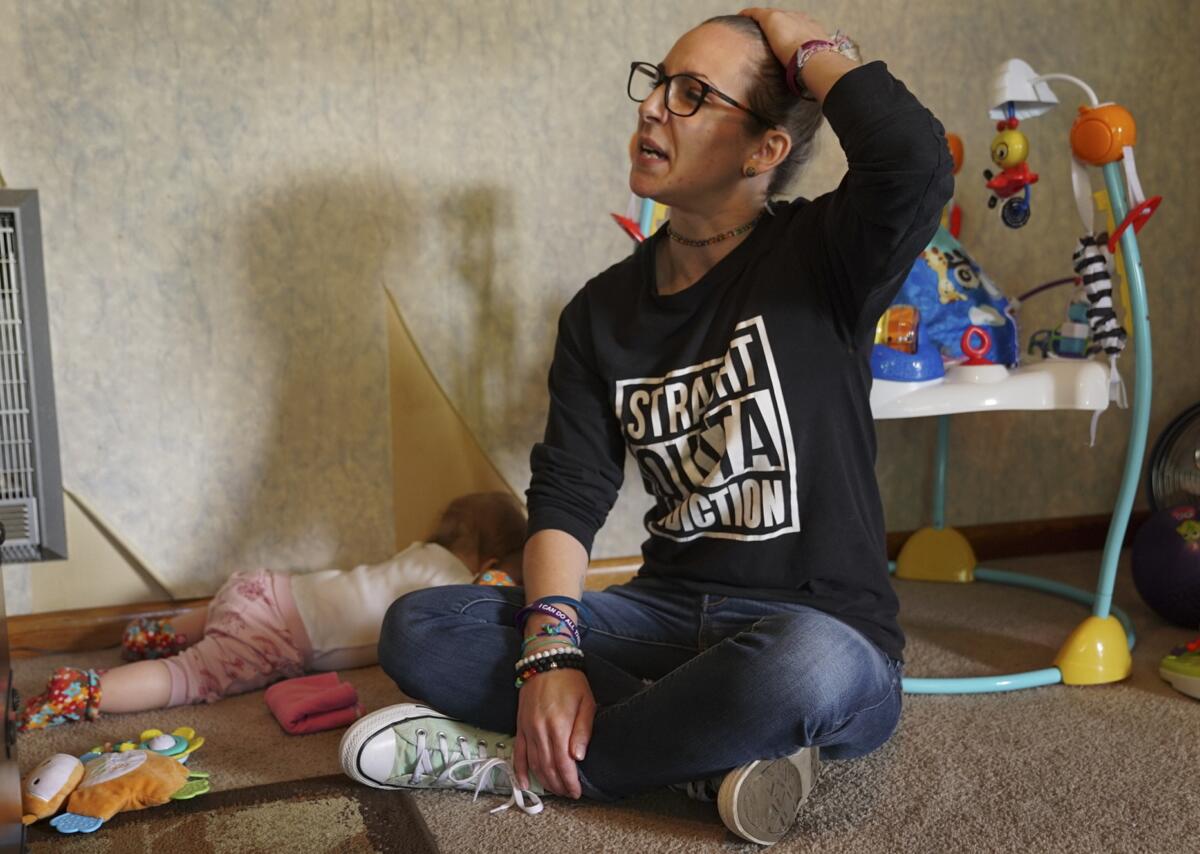
Towers did some research to craft a brochure he could give patients about the dangers of detoxing. What he found shocked him: There was no evidence, he said, that detoxing was hazardous to fetuses. The guidelines were based on two case studies of individual patients in the 1970s who lost their fetuses; Towers suspected those incidents were unrelated to detoxing. Studies in Australia showed there was no risk to fetuses at all.
The only danger, the studies showed, involved a woman relapsing, overdosing and dying. Towers thought he could manage that hazard. If the women consented, he put them on maintenance medications as recommended, but then tapered down their doses to zero.
Since 2012, Towers said, he has treated nearly 1,800 opioid addicts and successfully weaned 850 women off the narcotic through delivery. Among those patients, none experienced detox-related miscarriages or stillbirths, he said, and no babies were born in withdrawal.
About 450 patients relapsed after detoxing or were not able to fully detox; about 400 followed the national recommendations. More than half of the babies born to those two groups of women developed NAS, he said.
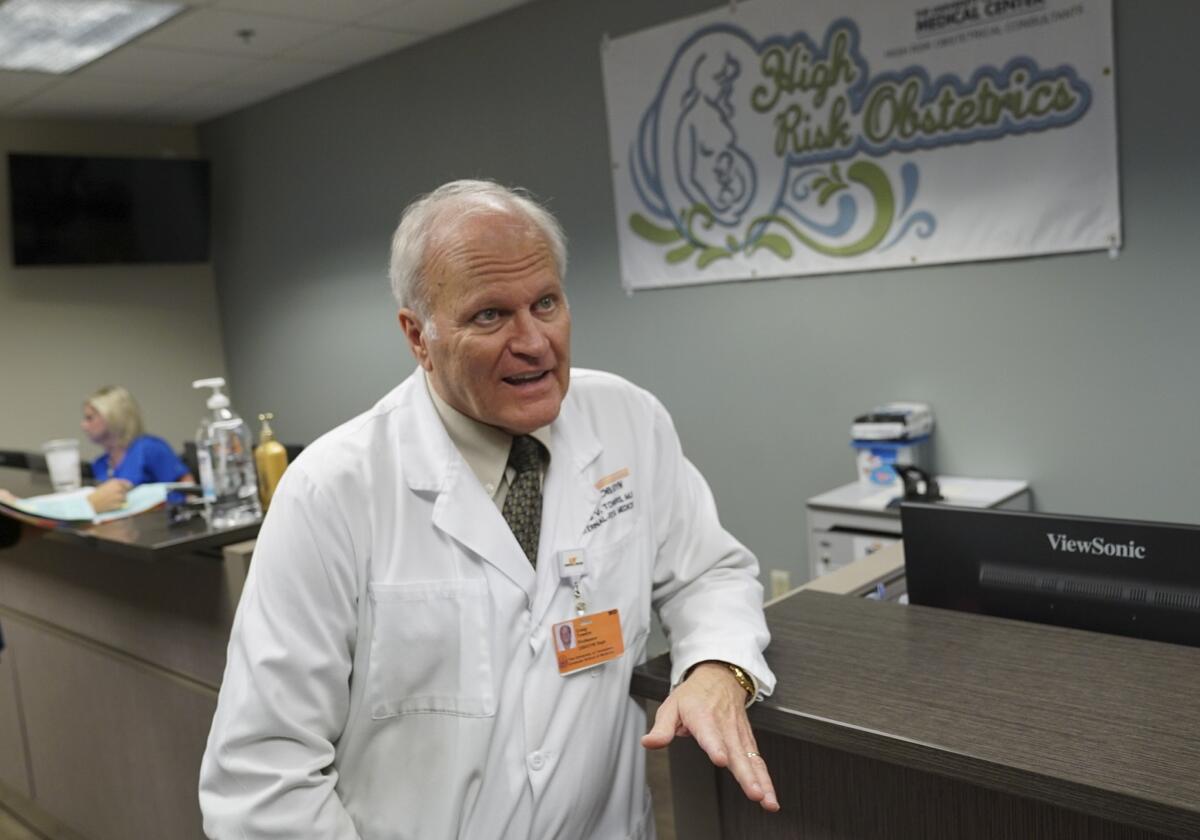
He published a study in 2016 on his findings, and in 2017 the American College of Obstetricians and Gynecologists amended guidelines to permit experienced doctors to help their patients taper off opioids, though it still recommends physicians follow its more conservative approach to drug treatment.
Some experts are wary about encouraging women to detox during pregnancy. They say Towers is too bold, pointing to relapse rates of between 40% and 60% for opioid addicts. Such women could die from overdoses. They also say that national data do not support Towers’ conclusion that detoxing leads to reduced chances of NAS because so many patients relapse, ultimately exposing their fetuses to opioids.
“Detoxing is not superior to medication,” said Dr. Mishka Terplan, an expert in obstetrics and addiction medicine who has written extensively on the topic.
Terplan, who is working on a large-scale study to assess the merits of detoxing while pregnant, said he recommends doctors use maintenance medications, though he believes physicians can help some patients detox on a case-by-case basis.
Towers says he evaluates each patient to see whether she can handle detoxing and has taken steps to reduce the chances of relapsing. His clinic has stepped up access to mental health counseling and ensures specialists are present to help women connect with jobs, social services, even rides. In 2017, he began prescribing naltrexone, a drug that combats drug cravings. In the last few years, he said, the relapse rate of his detoxing patients has dropped from 1 in 5 to 1 in 10.
Towers’ busiest day is Tuesday, when as many as 25 addicted women show up for appointments at his fourth-floor office in a building attached to the University of Tennessee Medical Center. On one such day last August, he was a blur of a lab coat — hustling up and down the halls, in and out of exam rooms, reviewing charts and ultrasound results, checking on patients’ progress in their pregnancies and drug treatment.
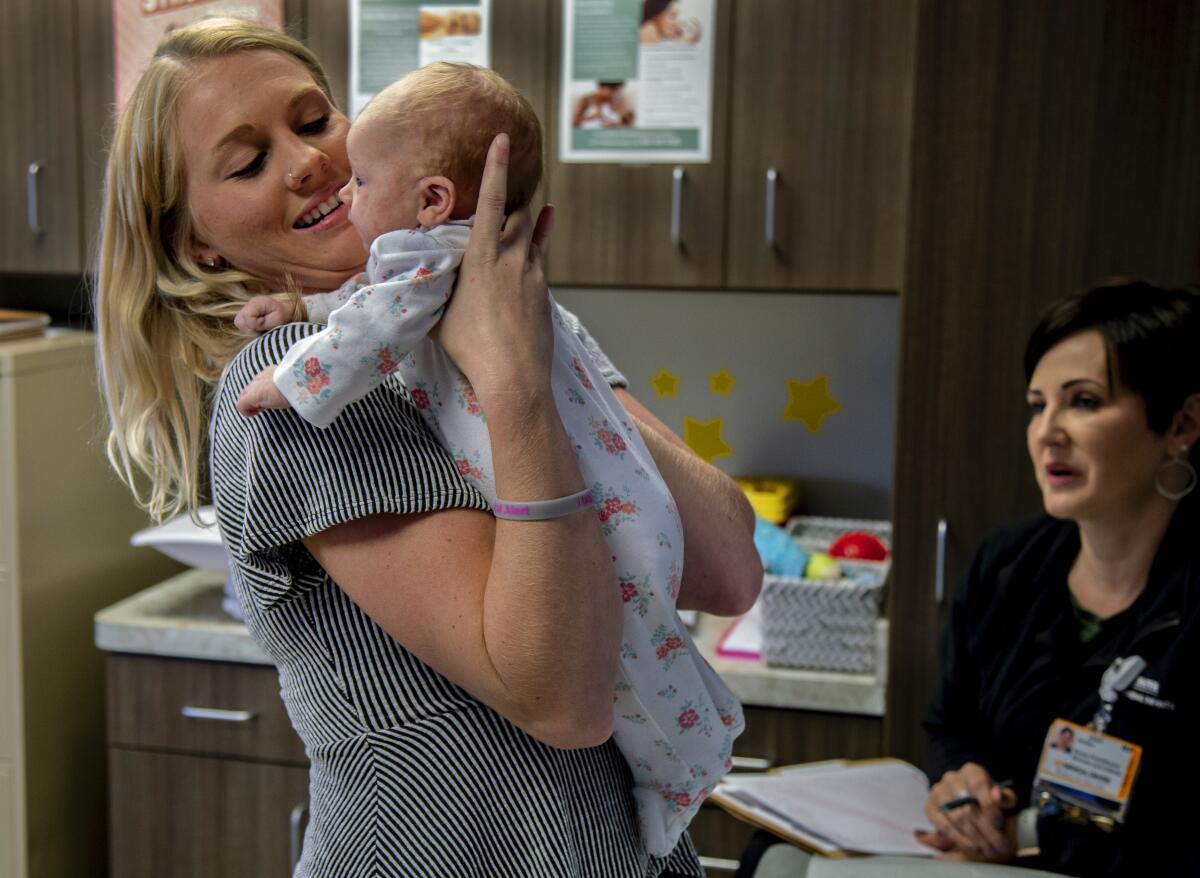
Many aspects of his exams were typical of any obstetrical appointment — ensuring babies were the right size, and their heads pointing down. He opined on the best elixir to take for diabetes tests. “Trust me,” he told more than one patient, “I have tasted them all, and the fruit punch and berry are the best ones.”
But the exams all eventually turned to patients’ struggles with opioids or other drugs.
He congratulated a 30-year-old who seemed to have turned a corner after two overdoses. He told a woman it was OK that she hadn’t been able to fully wean off the maintenance medication. And he comforted a 27-year-old patient near tears because another obstetrician would not let her detox.
“They told me I could kill my baby if I stopped,” she said.
Towers did some math. The patient was 27 weeks pregnant, and that gave them just 10 weeks to taper down before her delivery. “We’re going to have to be a little aggressive with this,” he counseled. She succeeded and later gave birth to an NAS-free child.
Over the years, Towers has learned an overriding truth about his patients: They are suffering. Many show scars of deep psychological and physical abuse. Most feel shame at exposing another life to drugs. Even after detoxing, many carry the weight of a question they are afraid to ask: Did they harm their babies? Handling such patients requires the most gentle of bedside manners.
Halfway through his Tuesday clinic that August afternoon, Towers checked on Kayla Daniell, 25, and could see she was doing much better than when she had entered his care six weeks earlier. A longtime addict who had started using drugs to cope with past sexual abuse, Daniell was now clean.
Even so, the physician could see she was anxious. He knew precisely why.
“Your baby is doing great,” he reassured her. “Just great.”
Daniell exhaled deeply, relieved. Six weeks later, she delivered a healthy girl.
To Towers, each such birth is a victory, a data point in a growing data set that he believes rebuts critics and proves his approach is safe and effective. It keeps him going, even when he should probably think about slowing down.
Last May, feeling intense chest pain, he saw a cardiologist and learned a major artery was 95% blocked. He received a stent. While he has cut back some, he has refused to give up his opioid clinic. There are too many Emily Lendermans to help.
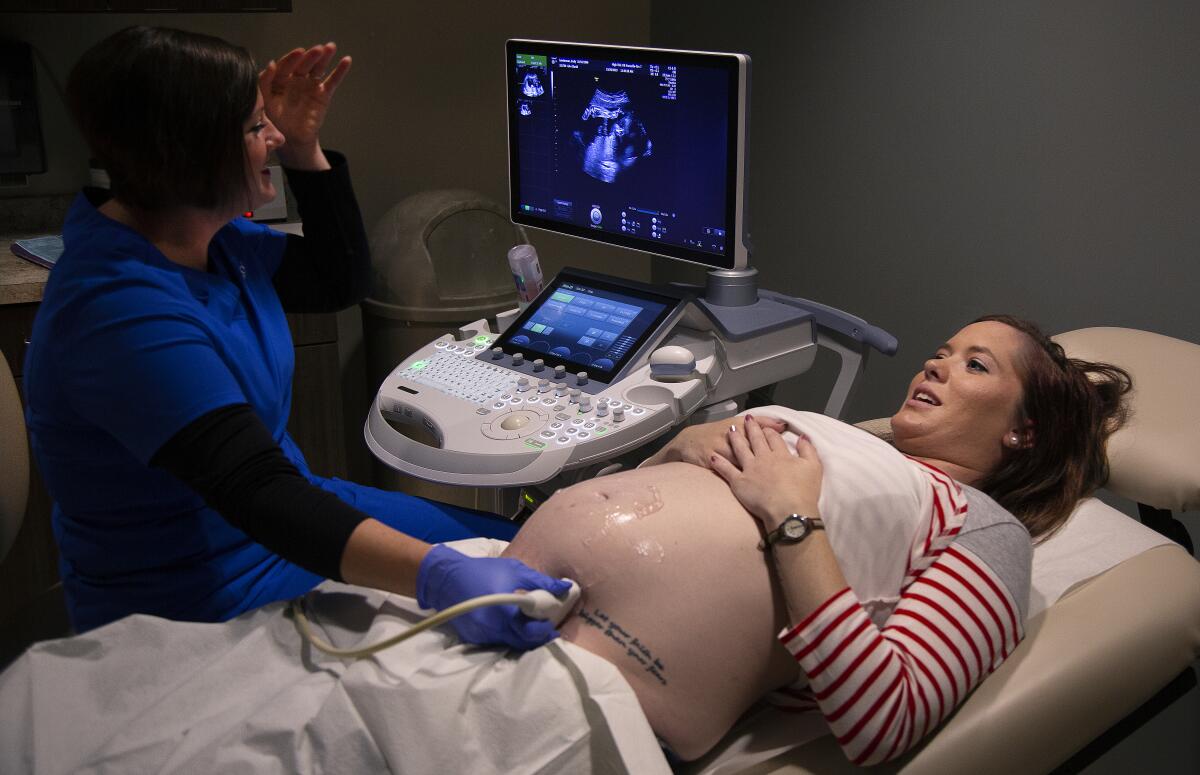
It was an afternoon in late October when Lenderman, now 23, walked briskly into the exam room for a routine follow-up. He had first seen Lenderman in August when he had locked eyes with her and asked whether she wanted to detox. Lenderman successfully completed a detox program and by this appointment seemed to be a wholly different person.
Her face was clear and bright, her hair perfectly combed. She laughed when her mother cracked a bad joke, and she peppered the ultrasound tech with questions. For the first time since Lenderman could remember, she was planning for her future. She wanted to become a nurse.
Towers was pleased by her progress and that of her pregnancy. But he could tell she remained unsettled.
“Your baby is doing great!”
She smiled broadly: “You’re a lifesaver.”
Three months later, in January, Lenderman gave birth to Luke, a healthy baby boy.
More to Read
Sign up for Essential California
The most important California stories and recommendations in your inbox every morning.
You may occasionally receive promotional content from the Los Angeles Times.

